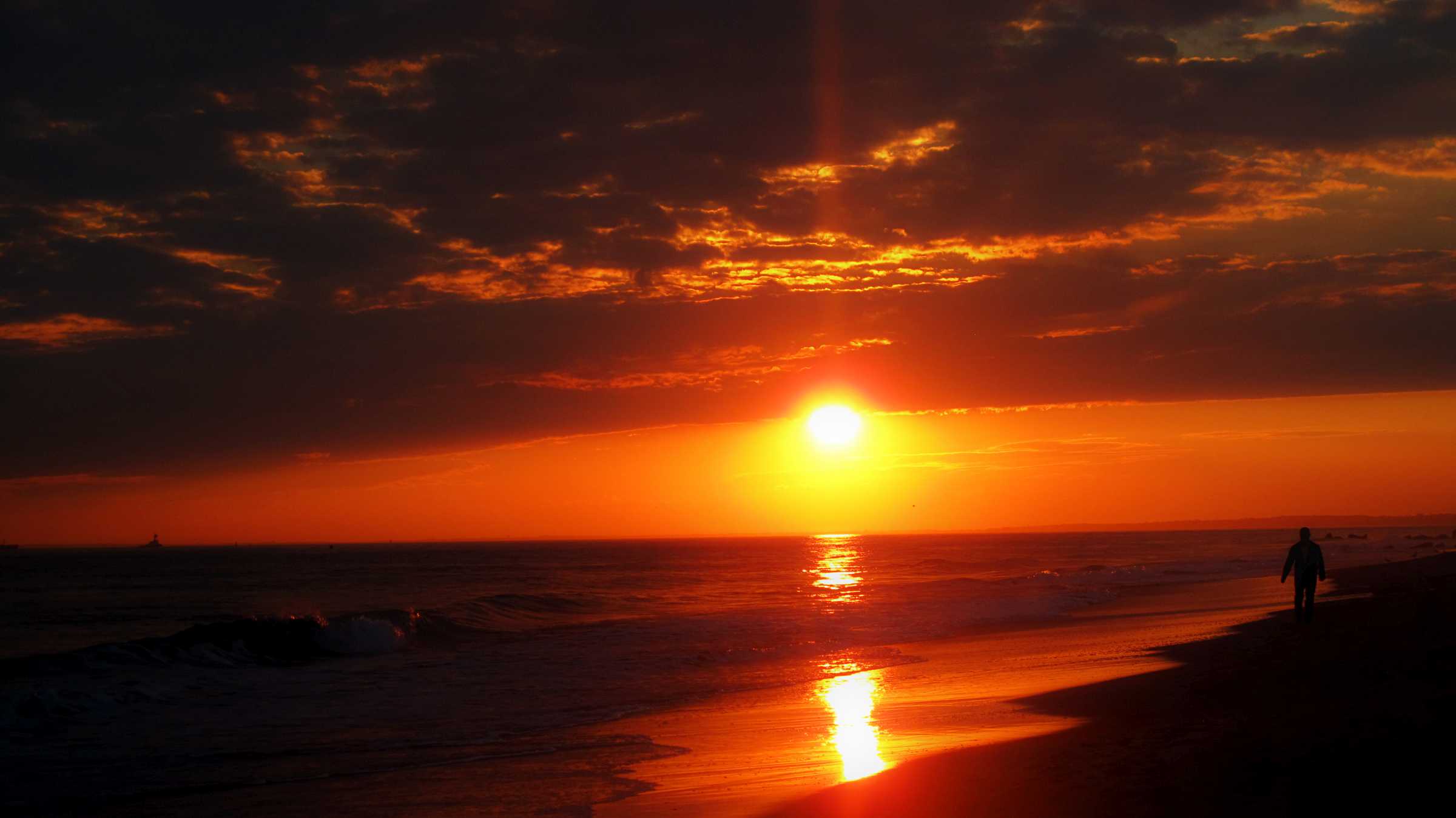Some parts of Nigeria have been sweltering through extreme heat precipitated by an upsurge in temperatures in the past weeks, spiking fears of outbreaks of diseases such as meningitis, cholera, among others.
The worst hit states, according to Daily Trust investigations, are Borno, Yobe, Adamawa, Kebbi, Sokoto, Zamfara, Katsina, Kano, and Jigawa.
The temperatures began soaring since March, hovering between 38 and 43 Celsius in most of the states, sending waves of discomfort.
According to the Nigerian meteorological agency (NiMeT), these soaring temperatures will continue up to May.
The agency has predicted
temperatures “above normal” in most southern, central and northern cities in its “Temperature Outlook and Warning Advisory” for April and May.
“This period is largely expected to be the warmest in the year because of the diurnal and periodic surge in the incursion of the southwesterly trade winds which will invariably accentuate the potential latent heat capacity of water vapor, an important contributor to urban heat quotient,” the official advisory said.
The hot weather which lasts for several days, often referred to as ‘a heatwave,’ according to NiMet, “can have a significant impact on our health. The impacts of heatwaves can be great and sometimes catastrophic.”
Some of the health challenges that may arise from the surging temperatures include heat rash, heat syncope, heat edema, heat cramps, life-threatening heatstroke, heat exhaustion, the agency said.
Findings by our reporters have shown that the poor supply of electricity across the country has worsened the situation. The situation was so intense that many states don’t even have potable water to drink or shower as advised by NiMet.
“Some of the consequences of this heatwave include the issue of meningitis, then kidney problem and heat stroke,” Dr Kabir Sada of the Federal Medical Centre Gusau told Daily Trust.
“Heat stroke is the situation whereby someone collapses as a result of high temperature or excessive heat. Even though heat stroke is very much common in Arabian countries where the temperature is much higher, therefore, people must be careful not to be exposing themselves to high temperatures,” he said.
In Borno, people sleep outside
In Borno state, the intense semiarid heat has forced the majority of the residents, including thousands of IDPs in their camps, to stay out of their rooms deep into the night, with a growing population sleeping outside their rooms, despite the security implication.
The decrease in electricity supply in the recent weeks has compounded the predicament of the residents of the Northeastern states, who are forced to patronise ‘cold water’ to cool down their boiling limbs, in flagrant violations of doctors’ advice against taking cold water.
“The most-brisk business is that of cold water and cold soft drinks, and I drink thrice to four times my usual quantity,” Adam Abubakar told Daily Trust. The temperature in Maiduguri fluctuates between 39 and 42 Celsius.
The heat is so much that “you can simply add Lipton (a tea bag) and sugar to the cup of water you take from every container because it is hot enough for tea,” Ali Musa said.
Heatwave forcing fruit sellers out of business in Yobe
The temperature reading between 40 and 41 Celsius with a dusty atmosphere is making lives of people and animal very unbearable in Damaturu, Yobe state capital.
Speaking to Daily Trust, a resident, Aisha Abubakar, said the harsh weather cannot be control with fan even when there is electricity in the afternoon.
“You have to take bath like four times and sit outside the room, preferably under a tree shed for you to deal with heat,” she said.
Another resident, Muhammad Mustapha, said the heat is more excruciating in the night because many people cannot sleep in their rooms.
“Majority of people are now sleeping outside their rooms because fans usually blow hot air. That if there is no electricity failure in the night,” he said.
However, fruits and vegetable sellers complained that the hot weather is causing them huge business lost.
A fruit seller along Gashua road, Badau Muhammad, said he had stopped buying fruits like graves, apples, and banana to avoid lost.
“Among these fruits, only banana is on high demand but people always want it very fresh, once it changes color, people don’t buy,” he said.
He said it is very difficult now to sell vegetable because it is perishable. “You have to cover it and sprinkle water on it continuously. Else it perishes,” another trader said.
Heatwave spreads fears in Adamawa
Residents of Yola and surrounding areas have decried excessive heat experienced due to high temperatures.
The average temperature rose to 41 to 42 degrees since the beginning of April with residents spending more time indoors or under trees and shades to avoid the scorching heat.
“I believe most of the deaths that occurred in Yola and Jimeta in recent weeks may not be unconnected with the heat waves, people are just dying. Families should always check with the sick and the old and also little children to make sure they are not dehydrated”, a resident, Adamu Bala advised.
Dr Impah Mathias of the Department of Medicine, Specialists Hospital Yola said the devastating effect of hot temperatures could lead to an outbreak of meningitis although the hospital had not yet recorded such cases.
In Zamfara, residents restrict movements at noon
The excessive heat in Zamfara has restricted the movements of residents, especially in the afternoon, as temperatures in Gusau fluctuate between 39 and 41 degrees Celsius.
“I don’t do things that would make me shuttle from one place to another especially at noon. At nights, we sleep outside our living rooms, although considerable improvement in power supply these days has helped matter a lot,” a resident, Sani Aliyu said.
In Sokoto, petrol sells between N164 to N200 per litre
Residents of Sokoto metropolis are groaning under harsh weather and low electricity supply in the state.
Recently, the average daily temperature in Sokoto state was ranging between 40 to 42 degrees Celsius, a situation that had rendered life extremely unbearable.
The situation has negatively affected socio-economic activities as some have now ground to a halt. Many of the residents have in the alternative chosen to put off many of their engagement due to the intensity of the harsh weather.
Regrettably, just as the residents’ demand for adequate power supply had soared, electricity supply from Kaduna Distribution Company has been grossly inadequate and epileptic.
Power supply from the company has been unreliable and load-shedding has been the order of the day.
In what appears to be an obnoxious twist, residents of the city and its environs were now groaning under a scarcity of petroleum product, just as a litter of petrol now cost between N164 and N200 in the black market since it is not readily available.
In Kano, people sleep in the open
In the last few weeks in Kano, the heat wave experienced as a result of the temperature change ranges from 37 to 42 degree Celsius and many residents have been facing a lot of challenges with the heat.
According to Malam Sagir Baba, he and his families have resorted to sleeping in the open to avoid the heat. “I and my family no longer sleeps in the room, we are now using mosquitos treated nets to sleep in the open, because the heat is too much and one cannot afford to be operating on electricity generating set due to the present economic situation and the electricity distribution company has chosen this period to starved us with light,” he said.
However, a health official with the Kano state hospital management board, Malam Abdullahi Sa’idu revealed that the high temperature being experienced recently can be dangerous to people if adequate awareness campaign on majors to manage the heat is not adopted.
In Katsina, babies cry all night
The average temperature in Katsina is between 36 and 38 degrees which has forced the residents to device several means to cool themselves from the severe hot weather.
Investigation showed that residents have resort to sleeping outsides their rooms for fresh air while many wet their floors and walls to reduce the heat just as others have double the number of their baths daily.
A resident of Sabon Layi Lawal Saidu said the heat is unbearable and couple with lack of power has worsened the situation.
“Men, women and even the most vulnerable are children who cry all night due to heat,” he said.
Another resident of Fagachi Quarters, Halilu Mohammed, said the heat forced him to take showers more often and sleeps on his balcony in the open.
What to do to stay safe
Health experts have warned residents to take precautionary measures against the heat wave that bites harder by the day.
A medical doctor, Dr Mohammad Sulieman Usman, said first and foremost is for a person to keep himself hydrated with at least taking at least 3-4 litres of water per day.
He said people should try and avoid the peak period of the sun between 12-3 pm by minimising movements. He said people should try as much as possible to stay in well-ventilated areas because heat and lack of ventilation lead to so many epidemics.
“People diagnosed with hypertension and diabetes is a period that they should pay attention to drugs and regular visits to the hospital for checks,” he said.
Dr Shehu Sambo said to avoid diseases such as meningitis and cholera, people should avoid sleeping in the overcrowded room as well as insist on taking clean water.
Dr Tijjani Ammani said it’s advisable that people should use light clothes and sunglasses during the day to avoid sunlight, to help filter out the sun’s harmful ultraviolet rays to protect the eyes.




